IBSC International Board of Specialty Certification APPROVED!
Live Critical Care Transport Review
Number of Courses: 30 Live 2-Hour Classes
Credit Awarded: 60 Hours
Credit Type: Advanced
Accredited: IBSC, CAPCE (F5-VILT), CE Broker (FL, KY, TN), Pennsylvania Bureau of EMS, and Virginia Office of EMS
Enrollment Period: One year or until completed, whichever comes first
Topics: Covers 16 hours required review course for IBSC renewal and all 60 hours of NREMT for paramedics.
Critical Care Transport thoroughly prepares medical professionals to function as competent members of a critical care team by covering the material that everyone—paramedics, nurses, physicians, and specialty crew—needs to know to operate effectively in the critical care environment.
This course meets the objectives of major Critical Care training programs. It covers both ground and flight transport and meets the objectives of Critical Care Transport certification exams such as the Certified Flight Paramedic (FP-C) and Critical Care Paramedic Certified (CCP-C) exam administered by IBSC.
Completion of this course does Not grant certification or licensure. Please check with your state EMS office for specific requirements within your state.
Classes offered in convenient blocks several times a month with a varying schedule to meet your needs. Classes can be taken in any order making it even easier!
Want to see when classes are offered, click here DistanceCME Course Calendar


